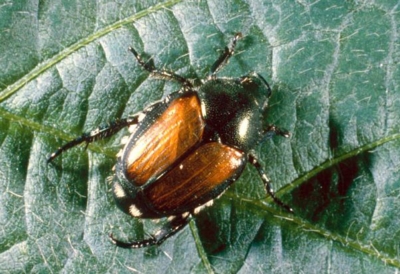The Japanese beetle feeds on a multitude of hosts and compared to the feeding cycle of the grubs, the turf calls for different management strategies to control the Japanese beetle population. If  many adult beetles are feeding on the leaves in the area, it does not necessarily mean that it is being caused by grub infestation in the turf.
many adult beetles are feeding on the leaves in the area, it does not necessarily mean that it is being caused by grub infestation in the turf.
One should always keep in mind that a combination of cultural, chemical, and mechanical controls should be used in order to get rid of the beetles for good. It is vital for you to choose a technique that is efficient and effective.
From the management standpoint, it is obligatory for you to consider that whether if you want to get rid of the grubs or the adult Japanese beetles. This is important because you have to use physical or cultural controls accordingly, for instance, you might be required to modify the habitat if you are trying to exterminate the grubs. The adult Japanese beetles can fly around, and thus, the control measures of the Japanese beetles differ on the basis of their life stages. You can get rid of the adult Japanese beetles in the morning using a physical removal method by shaking them off of the plants early in the morning when they are inactive.
You can kill them by shaking them off into a bucket of soapy water. Another physical control method is that of habitat modification, when you have to plant the foliage that is less attractive to the Japanese beetles. You can apply insecticides to the infested plants or area after careful evaluation. However, you should know that these chemicals have a detrimental impact on the environment and even on the organisms or plants that were not affected. To make sure that the insecticide is not immensely harmful, you have to use a relatively less toxic chemical for the management of the Japanese beetles.
The areas where the Japanese beetles cover a large area cannot be managed with the use of mechanical techniques, i.e. the traps. The Japanese beetle traps are considered to be ineffective as it does not reduce the number of beetles but it damages the nearby plants and vegetation. Controlling or managing the grub or the larvae can be efficiently done with the use of insecticides, as these are the most inactive stages of the life of the Japanese beetle. On the other hand, the chemical control method turns out to be the most effective management method if only the chemicals are applied at the right time.
The presence of the Japanese beetles on one plant attracts more beetles onto the similar plant. Thus, if the plant is made less attractive to the present beetles, it would not allow the other beetles to accumulate the plant. However, if you are considering a chemical management method then you should repeat the process so as to prevent re-infestation.
If your landscape has Japanese beetle infestation, call SprayTech at 720.248.0000 for treatment options or contact us via email.
Comments are closed.